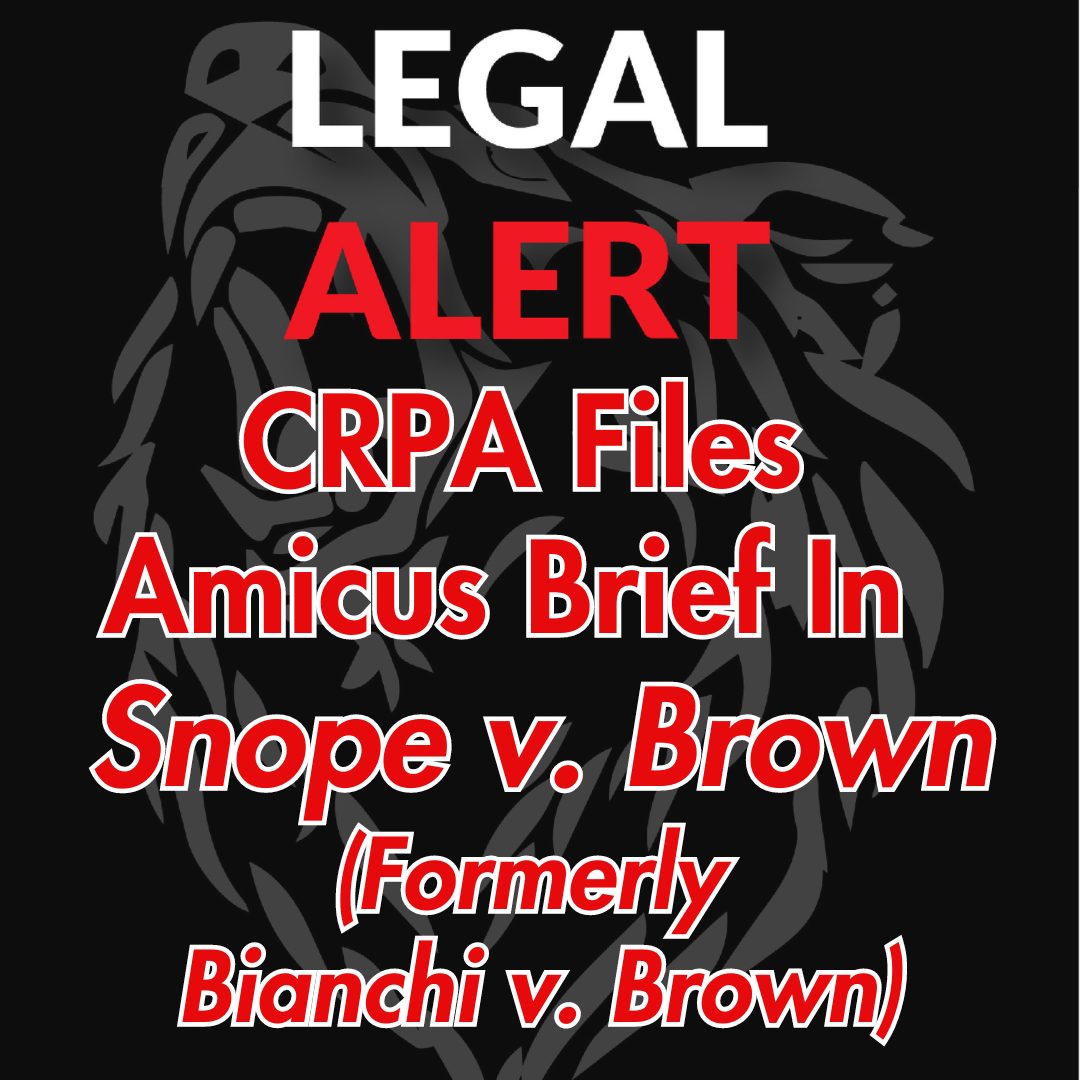CRPA & Allies File Amicus in Snope v. Brown (Formerly Bianchi)

CRPA is thrilled to announce the filing of a Supreme Court amicus brief urging the Court to grant review in Snope v. Brown, a lawsuit challenging Maryland’s ban on common semiautomatic rifles such as the AR-15. The state’s ban is similar to those seen in several other states, including California, Illinois, and New York. CRPA is joined in this brief by the Second Amendment Law Center, Federal Firearms Licensees of Illinois, Second Amendment Defense and Education Coalition, Operation Blazing Sword-Pink Pistols, and the Minnesota Gun Owners Caucus.
Snope, which was formerly known as Bianchi v. Brown, is the first “assault weapon” ban challenge to reach the Supreme Court post-Bruen following a final judgment. Prior certiorari petitions were appeals of preliminary injunction rulings. We are hopeful that given this final judgment posture, the Supreme Court will finally grant cert and decide once and for all that bans on common firearms are unconstitutional.
Our brief makes four arguments for why the Supreme Court should review the case. First, the Court must step in to stop the rise of the “Two Second Amendments” that have emerged after Bruen, under which the degree of Second Amendment rights a citizen has depends upon which circuit they live in. While some differences in state laws are to be expected, gun rights should not be dramatically different in Texas than they are in California. Second, we urge the Court to use this case as a vehicle to confirm that Bruen is a one-step test and explain how inferior courts are abusing a new “two-step” analysis that the Supreme Court never endorsed. Third, “arms” under the Second Amendment are not only those arms most commonly used for persona self-defense, as the amendment applies to arms used for all lawful purposes. Fourth, a firearm being suitable for military purposes, without more, does not take away Second Amendment protection because history supports that the provision also exists to promote the common defense.
Along with Duncan v. Bonta and ANJRPC v. Platkin (which are challenges to magazine capacity laws), Snope was remanded by the Supreme Court in 2022 following Bruen. Duncan is now awaiting a 9th Circuit en banc ruling like most of our cases in California and the Ninth Circuit.
Snope had the most unusual procedural history of all, as it sat for over a year awaiting a ruling from the three-judge panel. Then, the 4th Circuit announced it was taking the case en banc, before a panel ruling could happen. Oral arguments were heard, and a ruling was not expected for a while, as most predicted the 4th Circuit would stall as long as possible to prevent the Supreme Court hearing the case this term.
The 4th Circuit’s ruling came surprisingly quickly. On August 6, 2024 the en banc Court predictably upheld Maryland’s “assault weapons” ban on a 10-5 vote. The legal analysis by the majority focused heavily on interest-balancing arguments, defying the Supreme Court’s direction. Mass shootings and other horrific crimes involving common rifles were brought up frequently, whereas the tens of million of people who own these firearms for lawful purposes were ignored. More egregiously, the majority repeated the lie the 7th Circuit created in Bevis that weapons that are used by the military can be banned, and are not even “arms” under the Second Amendment. This ridiculous standard would mean that even muskets would not be protected during the revolutionary war, because both the Continental Army and the British Army used them. The majority also decided that just because a firearm is commonly owned, that does not grant it protection, and it still may be “dangerous and unusual.” Finally, lacking any clear analog to banning common rifles, the majority ruled that 19th Century restrictions on carrying things like bowie knives concealed were an appropriate analogue. The majority ignored that no state back then ever banned revolvers or repeating rifles, which are the true analogue to something like the AR-15 today.
The dissent took the majority’s poor logic to task, pointing out that it had completely ignored the anti-tyranny roots of the Second Amendment. In a lengthy historical overview, the dissent pointed out how 19th Century state court cases unanimously decided that small arms useful for warfare were protected most of all. It cited one case saying, prophetically, “If cowardly and dishonorable men sometimes shoot unarmed men with army pistols or guns, the evil must be prevented by the penitentiary and gallows, and not by a general deprivation of a constitutional privilege.” Rifles such as the AR-15 are clearly “arms”, and any restriction on them must come from historical tradition. The dissent concluded that the majority’s logic essentially amounts to an argument that if a weapon is “just too good at being a weapon”, it is unprotected by the Second Amendment.
